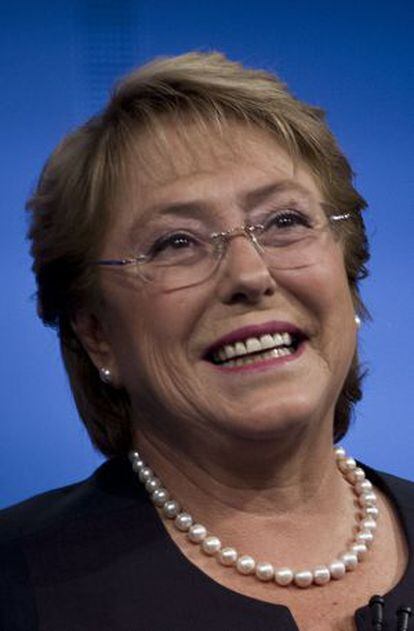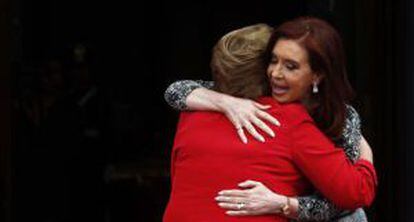“Ours is not a populist country, and we are not a populist government”
In this exclusive interview with EL PAÍS, Bachelet discusses her far-reaching reforms


The first question for Michelle Bachelet seems unavoidable in a country where every leader in power since the end of General Augusto Pinochet’s dictatorship in 1990 has tried to get re-elected — with the sole exception of Patricio Aylwin, and that was probably because of his advanced age.
Eduardo Frei, Ricardo Lagos, Bachelet and now Sebastián Piñera, who ended his term last March but is already rumored to be mulling a new campaign run, all sought re-election, although so far Bachelet is the first to actually achieve it.
“So why are you back?” I asked the president of Chile, who spoke to me last week inside the Blue Room of La Moneda Palace, the seat of government. Why this second term in office for someone who always stated that power never seemed desirable for its own sake, and who never felt addicted to it?
—I have no addiction to power whatsoever. Especially when, as president of the Republic, one knows that there are glorious moments but also very tough, difficult ones. Therefore, the reason for returning is not out of an addiction to this position, not at all, but rather the conviction that Chile had pending challenges ahead. And a significant number of people thought I had to be the person to lead this new process. It took me a long time to make the decision.
—What mistakes from your first term will you not be making again?
—The most important mistakes I or my government committed was when we failed to walk around in other people’s shoes to see exactly what was happening to them. They were good ideas, but the final consequences were not the best. Now a new period has begun that preserves all the good things from the past, changes what didn’t work, and addresses new tasks. Sometimes you have to conduct policies that change cultures and modify existing situations. It’s not about keeping everything the way it was, because progress would be impossible that way. But when change is effected, you need to give it enough time, or make it gradual, or carry out enough educational work to ensure that the process will not be dramatic.
It is precisely a lack of sufficient time and gradual introduction of government policies that Bachelet is being criticized for. She was a moderate during her first term and a radical populist during her second, her fiercest critics claim.
Whatever the case, it is true that ever since she took office on March 11, Bachelet’s administration has set a fast pace in its program of change: far-reaching tax reforms, changes to a voting system that is a legacy from the Pinochet era, measures to address Chile’s chronic energy shortages, and radical reforms to the education system ranging all the way from nursery to university. Before the end of the year the nation is also expecting to see an abortion law and labor reforms.
And all this, in the midst of a slowing economy that began losing steam under Piñera but got worse in recent months due to global and regional sluggishness.
Regarding tax reform, I asked the president whether the timing was right, and if not, whether this created unnecessary tension. The reform got congressional approval in the lower house thanks exclusively to the votes cast by the government coalition; it was only toward the end, when it was clear that the bill would go through the Senate without changes, that talks with the opposition took place, a few amendments were accepted and the law achieved a consensus. But the business sector, always contrary to higher taxes, felt the impact of three or four months of tension and uncertainty.
By addressing structural reforms, some people are getting a sense of uncertainty”
—Who knows? All I want to say is that I received all political parties right here, inside this very same room, at the very beginning, and I told them all the same thing: if you have any proposals that improve on our own and still manage to meet our two main goals — collecting $8 billion [€6.27 billion] and improving equitable taxation — do let us know. As long as those two criteria are met, I have no problem listening. But the truth is, there wasn’t a flurry of proposals... It seems like one can always look back after the fact and wonder whether you gave it enough time, or whether this or that, but in a short space of time we managed to forge a cross-party agreement. There’s an old saying, that it’s never a good time for tax reform because either the economy is doing great, so why would it need a tax reform, or else the economy is doing bad, so how can you think of tax reform now? I think in the end all the groups realized that the country needed permanent revenues for permanent expenditures, and I think this realization came from the fact that this is not a populist country and we are not a populist government.
This money, says Bachelet, is necessary to invest in better education in the mid to long term and improve Chile’s competitiveness, create more qualified jobs and keep bringing added wealth and welfare to a country that has been improving on these two fronts for several decades.
The added revenues will also help reduce inequality, another one of Bachelet’s great battles. While Chile’s per capita income is $23,000, not unlike Portugal or Greece, it is very unevenly distributed.
Bachelet notes that the reform will be spread out between 2014 and 2018, giving businesses time to adapt. She adds that the government does not have its own media outlets to counter the information being spread by sources that do not support the reform, leading citizens to become scared and believe things like the alleged imminent closure of all private schools in Chile.

I mention to her that in just a day-and-a-half in Santiago de Chile, I have already heard several radio calls to join a street demonstration against the reforms, and claims that the government means to shut down 1,500 schools.
—That’s why I’m telling you that there is an unjustified terror campaign against the changes. We don’t want to close down the private schools, we don’t want just public schools in Chile. What we do want is for the private schools to guarantee high-quality education. Some schools that get public subsidies are good, but there is a significant amount of them that have even more problems than the local public schools when you look at their long-term results. This means that significant public resources are being spent on centers that do not provide youngsters with a quality education. Our main goal is to transform a system in which education is a consumer good: whoever can pay for it gets the best one, and the others get whatever is left. Very often, talented youths never make it to university. During the dictatorship, public education became dependent on municipal authorities, so if a given municipality has the resources for it, it can afford magnificent schools with good technology, but if the municipality is poor, that is reflected in its schools. Our first great decision was that education cannot keep depending on the municipalities: it is reverting back to the state, where it used to be before the 1980s. It will be a decentralized system with regional, provincial and local levels, but the state will ultimately guarantee the resources. This will no longer depend on the mayor and the mayor’s assessment of the importance of education.
A certain degree of tension has been evident in recent weeks within the government coalition, Nueva Mayoría, which covers the political spectrum all the way from the Christian Democrats to the Communists and other more or less radical leftists — an amalgam that would be unthinkable in any other country without the common trauma of the Pinochet dictatorship. In this context, the political map is defined not so much in terms of the classic left and right as by the attitude that each group had toward the military regime.
A coalition senator recently spoke about the need to take a steamroller and crush the remains of the neoliberal model created by the dictatorship. Then, the newly appointed Chilean ambassador to Uruguay said, regarding a series of small-scale attacks, that in Chile it is the “right-wing business sector” that sets off bombs and the “fascistoid” right that opposes tax reform. As if that were not enough, he also mentioned the Christian Democrats’ role in Pinochet’s coup, disregarding the fact that this party is now a partner in government. None of this can help govern, I tell Bachelet.
If I look at the opposition’s statements, there are some tremendously hateful things being said”
—I have asked all our political leaders to be prudent with our statements. Everyone can hold personal opinions and assessments of what happened in Chile and the role that each political group played in it, both those in government and those in the opposition. I have asked everyone to seek common ground, and perhaps address our differences with respect. At a recent dinner with business leaders, I heard them talk about just this kind of statement. And I said, ‘How come you only notice these statements out of the mouths of people who belong to Nueva Mayoría?' Because if I look at the opposition’s statements, there are some tremendously hateful things being said. Tremendously hateful.
—You wouldn’t say that the country is more polarized now than it was four or eight years ago, then?
—I don’t think it is more polarized than it was four or eight years ago. What I think is that, by addressing structural reforms, some people are getting a sense of uncertainty. I will do everything in my power to avoid a polarization of our society beyond what is a healthy and normal debate of ideas, which can get passionate at times. I say, let us debate, but let us debate seriously, respectfully, with our sights set high. Because I learned the lessons of the past and I think that extreme polarization helps nobody. One can take part in the most heated debates, but later you meet up at a dinner and everyone says no hard feelings, this is politics, I have to play this role. I experienced polarization [in the 1970s] as a university student. We are not going through that now. But the government is being forced to be a lot more clear and explicit, to communicate better what we want to do, so that this uncertainty will be reduced and people will know what our goals are. But of course, it’s a whole other issue whether there are people who would like things to remain the way they are, and who even believe that there is no inequality in Chile.
—You will present the abortion legislation before the end of the year. How much of a margin will women have to make their own decisions?

—When you are president of a country, you may have your own opinions. But you have also pledged to respect a campaign program. As a woman, as a doctor, as executive director of the UN Women agency, I have always held that women have rights in all fields and that these rights cannot be restricted, and that we should be allowed to make decisions on all aspects. That is my personal opinion. But since Chile is light years behind on this issue, and because our coalition is made up of various sectors, I have pledged to decriminalize therapeutic abortion in three cases: rape, risk to the mother’s health, and severe fetal deformities that are incompatible with life. But I think that this requires a debate. We are analyzing the bill, but beyond that, I think that debating an issue that has not been debated in Chile for a long time also opens up the whole subject of women’s rights.
—Your first trip abroad was to Argentina, where you spoke of the need to bring the Pacific Alliance trade bloc closer to Mercosur. Do you believe this is possible or even that it makes any sense? These two alliances are very different in their political, commercial, even legal foundations.
—Chile is an active member of the Pacific Alliance. It was my predecessor’s initiative and the truth is, it is a very positive membership, very useful. I really believe it is very pragmatic, not at all a political alliance. This is a trade alliance and a customs alliance that enables the free movement of goods, products and people. This is not about the Pacific turning its back on the Atlantic. This is not an exclusive club. I would say: the main thing is that I am not in favor of any process that excludes or turns its back on other countries in the region.










































